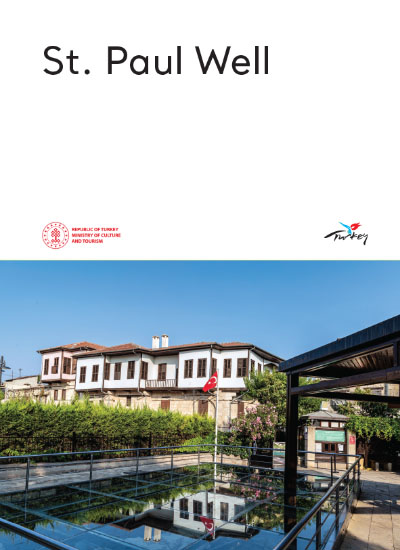The St Paul’s well is situated in the centre of Tarsus district, approximately 300 metres north of the Cumhuriyet Area in Kızılmurat Quarter. This area is characterised by a high density of ancient Tarsus houses. The well is located in a courtyard, which has long been accepted as the place of St Paul's house. The 18-metre-deep well, situated approximately 200 metres northeast of the ancient Street, is believed to have been constructed in honour of Saint Paul. The remains of an ancient site have been incorporated into the structure, which has been used as a place of worship for many years. This sanctuary is also a popular destination for local and foreign visitors today. Christians visit this holy place for pilgrimage and believe that the well water is sacred and has healing properties. St Paul, who played a pivotal role in the spread and institutionalisation of Christianity and whose name is mentioned in the Bible as the “herald”, was born in Tarsus in the early 1st century BC to a Jewish aristocratic family with Roman citizenship. At that time, the wealth and sophistication of Tarsus was reflected in the cultural life of the city. One of the prominent philosophy schools of the period was established in Tarsus. St Paul received his primary education in Tarsus and continued his education in Jerusalem. During this period, he became acquainted with Christianity and initially engaged in the attacks against Christianity. For a long time, he sought to dissuade those who believed in Jesus from their faith. He embraced Christianity upon seeing Jesus in his dream. During his lifetime, St. Paul worked to advance Christianity until he was captured and died. He traversed a significant portion of the Roman Empire for this purpose, and was esteemed and respected for his ideas and contributions. He gained a prominent position in the Christian Church and was regarded as the founder of the Church alongside St. Peter. The Roman authorities were disconcerted by Paul's missionary activities and arrested him. He was taken to Rome for trial, where he was executed in 60 BC. Paul is regarded as one of the most significant figures in the history of Christianity. He is regarded as a theologian and philosopher who transformed Christianity from a sect of Judaism into a distinct religion. He is also regarded as the founder of the first churches. He is frequently referred to as the "Apostle of Tarsus" in literary works. The letters he wrote during his travels were regarded as an archaeological document and as valuable examples of Christian literature, including detailed information about the period.
TARSUS ST.PAUL WELL


